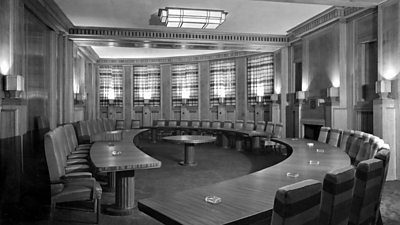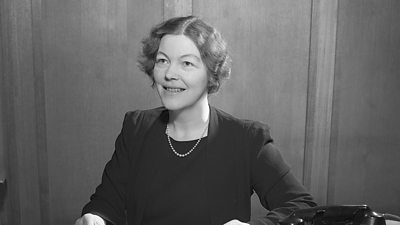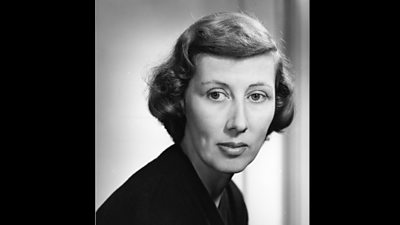Women had held senior positions in the ΒιΆΉΤΌΕΔ since the 1920s, yet it took almost seventy years before women served on the Board of Management. What can newly-released interviews from the ΒιΆΉΤΌΕΔ Oral History Collection tell us about the status and influence of women who reached the top?
In 1932, Hilda Matheson left the ΒιΆΉΤΌΕΔ. For five years she had held the highly influential position of Director of Talks, but she was not a member of John Reithβs Control Board, his inner core of senior executives. However, her successor, Charles Siepmann was.

Siepmann believed that his elevation to the board was the result of the major restructuring that followed Mathesonβs resignation in 1932, as he recalled in this short excerpt from his newly released oral history interview:
With Mathesonβs departure, Mary Somerville became the most senior woman in the ΒιΆΉΤΌΕΔ, as Director of School Broadcasting though, like Matheson, she was not on the Board.

In 1947, after sixteen years in this Directorial role, Somerville moved to a new post as Assistant Controller, Talks. Then, in 1950, she became the ΒιΆΉΤΌΕΔβs first female Controller, as Controller of Talks, with the responsibility of overseeing the spoken word output on both radio and TV. It was a post she held until her retirement in 1955, but again without Board status.
By this time, though, the ΒιΆΉΤΌΕΔ had grown so large that Controllers, whether male or female, were no longer part of the top team.
And this would apply to Joanna Spicer. In 1963, twenty years after her first foray into planning, as Empire Service Programme Planner, Spicer was promoted to the position of Assistant Controller, Planning (Television). But with no βControllerβ to assist, Spicer was effectively denied the title.

Leonard Miall, in his book Inside the ΒιΆΉΤΌΕΔ, suggests that the designation 'Assistant' could be ascribed to, "a certain ΒιΆΉΤΌΕΔ male chauvinist swinishness". He had no doubt that Spicer was the "power behind the thrones" of many Programme Controllers. And her job was a crucial one: to plan for and oversee the allocation of ΒιΆΉΤΌΕΔ resources.
One of her innovations was the introduction of the 'offers' system, a way of prioritising resourcing requests. But as she told Frank Gillard in her ΒιΆΉΤΌΕΔ Oral History Collection interview, being 'ACP Tel' (her abbreviated title) was never straightforward:
Joanna Spicer was promoted in 1969, not to Controller, but yet again to Assistant Controller, Television Development. She retired in 1973.
The second woman to achieve Controller status was Clare Lawson Dick, who was appointed Controller of Radio 4 in 1975, the culmination of her more than thirty five years at the ΒιΆΉΤΌΕΔ.
In 1968, Lawson Dick had spent eleven months as Acting Controller, Radio 4; she then assisted Tony Whitby for six years, when he was appointed Controller in 1969.
Whitby died in 1975, which was when Lawson Dick assumed the role. Although it was for only 18 months, these were arduous times, as her ΒιΆΉΤΌΕΔ oral history reminiscences lay bare:
It was in happier circumstances that Monica Sims became Controller of Radio 4, in 1978 and then the first woman Director of Programmes, Radio in 1983, overseeing all ΒιΆΉΤΌΕΔ Radio networks. Sims was a rarity. As her Women in ΒιΆΉΤΌΕΔ Management report shows, in 1985 just six women held top grade positions.
Frances Line was to join this small but growing band of women in top posts. In 1990, now 33-years into her ΒιΆΉΤΌΕΔ career, she was promoted to Controller, Radio Two. This was a period when competition from commercial radio was hotting up and, as Controller, Line was determined to update the feel of the network and to put it firmly "on the map", as her newly released ΒιΆΉΤΌΕΔ Oral History Collection interview reveals:
"The first thing I did was to introduce a proper music policy. It may seem very strange for a music network but by day no-one quite knew what they were meant to be playing. People were just playing whatever took their fancy in a way and they vaguely knew it was Radio 2 but they didn't know how to judge the music. And we came up with some watch words ... I came up with some watch words - four of them." - Interview with Frances Line, 1996. From the ΒιΆΉΤΌΕΔ Oral History Collection.
The four words were 'melody', 'familiarity', 'people' and 'breadth', as she explained:
"'Melody' - everything on that network should be melodic, it should be a melodic sound; 'familiarity' - I wanted a spine of familiar music because that would hold people with us ... people ... all research demonstrates people like to hear things that they know, with the odd surprise; 'breadth' - I wanted great breadth of styles. I didn't just want us to be playing old records or old pop hits, I wanted some of that, of course, but also all sorts of other music." - Interview with Frances Line, 1996. From the ΒιΆΉΤΌΕΔ Oral History Collection.
Line wanted folk and jazz music, country music, military bands - even yodelling. What she called "a real tapestry of music". She also took a new approach to presenters. Rather than using a staff announcer to cover when they went on leave, she started to invite stars to take over their slots:
"I mean, Neil Kinnock sitting in for Jimmy Young; John Stalker sitting in for John Dunn. These were not people who could do it all the time but they were β¦ they were guests on the network, they brightened it up, people were listening just to see what on earth happened, you know, what is Neil Kinnock going to say today? And it was a very exciting time because it meant that the papers were often you know showing much more interest in the network and trying to find out what we were going to do, who we were going to book in the way of star names." - Interview with Frances Line, 1996. From the ΒιΆΉΤΌΕΔ Oral History Collection.
One of those Line invited to broadcast was Earl Spencer, the father of Diana, Princess of Wales, who did his own series on classical music. "I always thought it looked very strange in Radio Times" she ventured, "it just said, 'Eight o'clock, Earl Spencer'. It might have looked a bit like Duke Ellington or whatever".
Other guests included Norma Major, the wife of the Prime Minister John Major, who did a Christmas special; actors from the long-running ΒιΆΉΤΌΕΔ One drama EastEnders and Sir Dirk Bogart who sat in for David Jacobs while he was on holiday.
"It was good and exciting to have these different people working for us. So I'd got all that going; that was going along quite nicely. But the real urgency, I thought, when I became Controller was to give the network a little more gravitas, a bit more bottom. I thought it was a bit light. It needed to be properly distinctive in order to survive in this new world of commercial competition." - Interview with Frances Line, 1996. From the ΒιΆΉΤΌΕΔ Oral History Collection.
Frances Line was Controller, Radio 2 until her retirement in 1996.
In the meantime, the glass ceiling of the ΒιΆΉΤΌΕΔ Board of Management had finally been cracked. This was by Margaret Salmon who, in 1991, was recruited to the post of Director of Personnel. Salmon was one of only a handful of senior women to have been 'headhunted' by the Corporation, rather than 'home-grown'. By 1993, four women were Board members although, after 1995, this dropped back to just two members until 2000.
In 2001 Jana Bennett, the newly appointed Director of Television, was one of five women on the 18-member executive team. Bennett had been with the ΒιΆΉΤΌΕΔ since 1979 (apart from a 3-year break) rising to become the first woman Editor of the flagship science programme Horizon, and then the first woman Head of Science.
In her role as Director of Television in the early 2000s, she was central to the ΒιΆΉΤΌΕΔ's digital expansion. Her oral history interview gives an insiders account of the early years of digital expansion and shows her concerns that the ΒιΆΉΤΌΕΔ could have been marginalised by the digital revolution, through what she saw as a culture of complacency:
In 2005, Zarin Patel was elevated to the Executive Board, as Group Finance Director. Since her arrival at the ΒιΆΉΤΌΕΔ in 1998, she had played an important role within the finance department which included the responsibility for the collection of the TV Licence fee income.
Much of the focus of her oral history interview is the role she played in the negotiations for the 2011 licence fee settlement.
With the Conservatives newly in power, and the prospect of severe spending cuts, she was asked to reflect back to the summer of 2010, and whether she was worried about the prospect of a two-year licence fee negotiation:
Zarin Patel is one of an elite band of ΒιΆΉΤΌΕΔ women who have made it to the Board.
In the 25 years following Margaret Salmonβs appointment in 1991, seventeen ΒιΆΉΤΌΕΔ women followed her lead.
The ΒιΆΉΤΌΕΔ's 2017-18 Equality Information Report showed that female staff now accounted for 43.3% of senior leadership roles. Currently six out of the fifteen members of the ΒιΆΉΤΌΕΔβs Executive Committee are women.
One of these, Anne Bulford, is the first woman to be Deputy Director-General. However there is yet to be a female Director-General of the ΒιΆΉΤΌΕΔ.
Written by Dr Kate Murphy, Bournemouth University.

